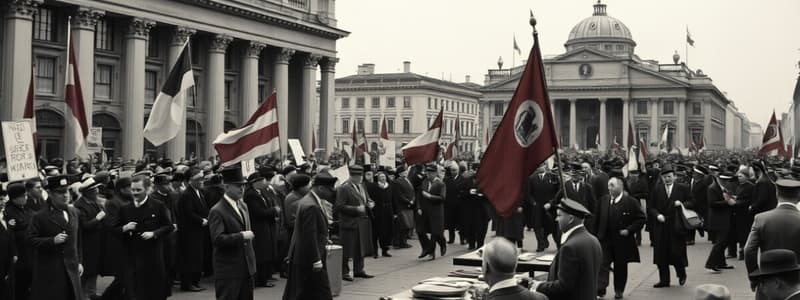Podcast
Questions and Answers
What is socialism?
What is socialism?
- A radical ideology
- A type of advertising technique
- An economic system where factors of production are publicly owned (correct)
- A political belief advocating for no government
Anarchism advocates for government intervention in society.
Anarchism advocates for government intervention in society.
False (B)
Who were Sacco & Vanzetti?
Who were Sacco & Vanzetti?
Italian anarchist radicals executed for robbery/murder.
What was the Great Migration?
What was the Great Migration?
What was the Red Scare?
What was the Red Scare?
What triggered the Palmer Raids?
What triggered the Palmer Raids?
What did modern advertising aim to achieve?
What did modern advertising aim to achieve?
Buying on credit allows consumers to pay for items upfront.
Buying on credit allows consumers to pay for items upfront.
The ______ was a name given to the summer of 1919 due to urban race riots.
The ______ was a name given to the summer of 1919 due to urban race riots.
What were quota systems?
What were quota systems?
Flashcards are hidden until you start studying
Study Notes
Socialism
- Economic system with public ownership of production, aimed at collective welfare.
- Government often provides services like healthcare and education through high taxes.
- Viewed as a precursor to communism; fears of socialism contributed to the Palmer Raids initiated by A. Mitchell Palmer.
Anarchism
- Political belief opposing government; advocates for collective societal improvement.
- Associated with fears of government overthrow, leading to increased vigilance during the Palmer Raids.
Radicals
- Individuals advocating for significant government change, often supporting ideologies like anarchism, communism, or socialism.
- Perceived as a threat; non-U.S. radicals faced deportation due to their extreme views.
Sacco & Vanzetti
- Italian anarchists symbolizing the Red Scare; arrested in 1920, convicted in 1927 for robbery/murder.
- Many believed they were victims of bias driven by their immigrant status and political beliefs.
Quota Systems
- Comprises the Emergency Quota Act of 1921 and the Immigration Act of 1924.
- Marked a significant shift in U.S. immigration policy, drastically reducing the number of permissible immigrants.
- By 1931, net immigration to the U.S. declined, with more people leaving than entering.
The Great Migration
- Relocation of approximately 1.5 million African Americans from the South to Northern cities between 1916 and 1930.
- Resulted in significant racial tension, prominently seen during the Red Summer of 1919.
- Major destinations included Harlem, Chicago, Cleveland, and Detroit, which later developed into African American ghettos.
The Red Scare
- Period of intense fear regarding the spread of communism in the U.S. post-World War I.
- Linked to concerns about the potential for a communist revolution and activities of the Comintern aimed at global communist expansion.
The Palmer Raids
- Series of government-led raids targeting suspected radicals, spearheaded by U.S. Attorney General A. Mitchell Palmer.
- Aim was to uncover radical communists; however, the raids largely failed and resulted in Palmer's loss of credibility after no significant incidents occurred on May 1, 1920.
The Red Summer
- Term for the summer of 1919, characterized by 26 race riots across urban America in reaction to racial tensions exacerbated by the Great Migration.
- Notably began with the Chicago Race Riots, symbolizing increasing militancy among African Americans against discrimination.
Modern Advertising
- Innovative public notices designed to boost product sales through suggestive marketing strategies.
- Emerged as a response to mass production in the 1920s; focused on capturing consumer attention to drive sales.
Buying on Credit / Installment Buying
- Credit allows consumers to purchase items with future payment commitments; installment buying enables payment over time.
- Facilitated increased consumer sales but included interest fees; potential pitfall as inability to repay contributed to the onset of the Great Depression.
Studying That Suits You
Use AI to generate personalized quizzes and flashcards to suit your learning preferences.




